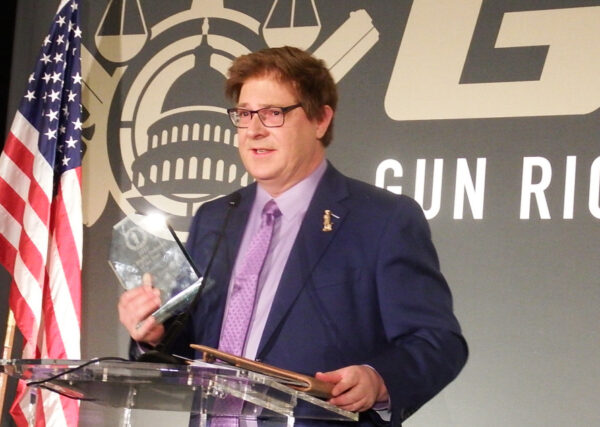
Posted on 10/04/2025 6:12:14 AM PDT by marktwain

Mark W Smith with the Defender of Gun Rights of the Year for 2025 award, presented to him at GRPC 2025 in Salt Lake City.
The 40th Gun Rights Policy Conference (GRPC), was held at the Salt Lake City Marriott on September 26-28, 2025. Registration on site started on Friday, with a reception Friday night starting at 7 p.m. These receptions are always interesting. Attendees are able to hobnob with movers and shakers among Second Amendment supporters.
On Friday, before the GRPC registration, media was invited to attend a separate but related event, the AMM*Con, a Second Amendment Media Workshop. The AMM*Con is aimed at Second Amendment oriented media as a way to improve the skills of media covering firearms and Second Amendment issues.
Every presentation offered techniques and ways to improve reporting, coverage, and reach for the reporters, bloggers, Youtubers, writers, and podcasters which were present. Presentations included such topics as “Pitch Sheet & Earned Media”, “Turning Strangers into Raving Fans”, and “Rebranding an Organization”.
In this correspondent’s opinion, the star of the day was Mark W. Smith, prominent constitutional attorney, member of the United States Supreme Court Bar, Host of the excellent Youtube channel the Four Boxes Diner, and AmmoLand contributor.
Mark gave a supercharged and superbly informative one hour presentation at AMM*Con. The subject was “How to Report on 2A Supreme Court and Other Cases”. Mark explained the different types of cases which are filed in the courts. He explained what organizations look for in cases to pick for Second Amendment challenges.
(Excerpt) Read more at ammoland.com ...
SCOTUS needs to finally address the words “shall no be infringed” mean in the 2A. The courts act as though those words aren’t there at all.
Mark addressed that. He said the only word in the Second Amendment the Supreme Court has not defined is “infringed”.
He said the reason is because to know if something is infringed, you have to know what it is. He gave a non-controversial example.
The right to keep and bear arms does not allow you to shoot and kill people who are not being aggressive toward you. It was well understood, at the time of the ratification of the bill of rights, that was so.
Is it an “infringement” for a property owner to tell you to leave when he notices you are armed? No, it is not.
Mark said the court cases are firming up exactly where the boundaries are, based on the laws which existed when the Second Amendment was ratified.
Thus, we are learning what “infringed” means from the cases which are being settled now.
Well, that sounds somewhat hopeful.
Of course if you shoot someone without cause you deprive them of their right to life, liberty and the pursuit of happiness.
To punish you for that is not an infringement.
If a property owner tells you to leave if you are armed he is asserting his own right and is not a government infringing your right.
On the other hand, the majority of gun laws imposed by various levels of government do infringe on your right to own or bear arms.
The reason Justice Thomas used the “History and tradition” measure for determining what restrictions were allowed under the meaning of “keep and bear arms” at the time of ratification is a key to originalism.
What Thomas encapsulated is the way to determine what “keep and bear” means is to know what it meant to the people at the time they ratified the Bill of Rights.
This is why it means more than just militia duty. At the time, it was clear “keep and bear” meant the ability to have and carry weapons for any legitimate purpose. These included defense of self and others, included in that was cooperating with others for the common defense, which includes militias.
It also included hunting, target practice, accouterments and accessories.
There were some limits, but they are mostly understandable. You can be disarmed when you are taken into custody for a crime, for example.
Yes. Nobody ever suggested, hey you don’t need a rifled gun because they are deadly for twice the distance of a smooth bore musket. Those are military weapons that have no place in civilian hands.
If someone did they would have been run out of town on a rail.
Such ideas were not acceptable until roughly two generations after the ratification of the Constitution.
In 1833,46 years after the Constitution was adopted, and 42 years after the ratification of the Bill of Rights, the Supreme Court ruled the Bill of Rights did not apply to the states.
There was quite a bit of dispute about this. The Civil war and the Fourteenth Amendment were meant, in part, to correct the Supreme Court 1833 decision.
Disclaimer: Opinions posted on Free Republic are those of the individual posters and do not necessarily represent the opinion of Free Republic or its management. All materials posted herein are protected by copyright law and the exemption for fair use of copyrighted works.